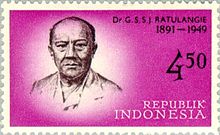Sam Ratulangi
Sam Ratulangi , actually Gerungan Saul Samuel Jacob Ratulangi, (born November 5, 1890 in Tondano , Sulawesi Utara , † June 30, 1949 in Jakarta ) was an Indonesian politician, journalist and teacher. In Indonesia he is considered the hero of the independence movement against the Dutch colonial rulers.
In Indonesia he is often called Dr. GSSJ Ratulangi cited.
Life
Ratulangi came from a respected and wealthy family of the Minahasa ethnic group , he was the son of the teacher Jozias Ratulangi and Agustina Gerungan. Ratulangi, who was a Christian, attended schools in Tondano and the Queen Wilhelmina School (an engineering school in Batavia ) in what was then the Dutch East Indies . After graduating, he worked as an engineer in road construction and in the railroad, but personal experiences of racist discrimination by the Dutch (for example in terms of pay and accommodation for employees) prompted him to pursue a university degree. He studied in Amsterdam to become a teacher, received his diploma as a science teacher in Amsterdam in 1915 and his doctorate at the University of Zurich (1919). Even in Amsterdam he was a leader in the Indonesian student union. After returning to Indonesia, he was a teacher at a high school (Algemene Middlebare School) in Yogyakarta . After a campaign against the teaching of Dutch children by Indonesians, he gave up the teaching profession and went to Bandung to found the insurance company Assurantie Maatschappij Indonesia and was its chairman from 1922 to 1924. He was also secretary of the Association of Minahasa Students, which he used for political activities. In 1927 he was elected to the colony's parliament (Volksraad) and he was secretary of the Minahasa council. He campaigned for more rights for the Indonesian people under the Dutch colonial rulers and the abolition of forced labor ( called Herendiensten ), in which he was successful. In 1932 he was one of the founders of the Association of Indonesian Academics (Vereniging van Indonesische Academici, VIA). His time as a parliamentarian ended after he was imprisoned for several months in 1937 for his political activities. Ratulangi then worked as a journalist and published the magazine Nationale Commentaren . In 1937 his book Indonesia in the Pacific appeared , in which he foresaw a threat from Japan and a future role for Indonesia in the Pacific region. Another book De Pacific appeared in 1938 and he also published on mathematics.
After the defeat of the Japanese in 1945, he was on the preparatory committee for Indonesian independence and was appointed governor of Celebes by Sukarno in August . In April 1946 he was arrested by the Dutch colonial rulers and sentenced to three years in exile on the small island of Yapen near New Guinea . In March 1948 he was released to Yogyakarta, but imprisoned again in December, but soon afterwards released again in February 1949 because his health deteriorated. He died soon after and was buried in Tondano.
He was married twice. The first marriage to a Dutch psychiatrist (Suze Houtman) ended in divorce. He had two children from his first marriage and three children from his second marriage to Tjen Tambajong.
Honors
In 1961 he was named Indonesia's national independence hero by Sukarno. The Universitas Sam Ratulangi , Sam Ratulangi Airport in Manado , the Sam Ratulangi PB 1600 and a submarine of the Indonesian Navy are named after him.
Web links
References and comments
- ↑ Officially for embezzlement. The VIA had invited the Philippine President and his wife to a meeting and paid for their stay
- ↑ curves systems in Volstaendigen figures , in 1917, De meetkunde voor Euclides (mathematics before Euclid), Natuurwetenschappelijk Congres 1920 Een method voor het 2e van Graphically teekenen graadscurven , 1922
| personal data | |
|---|---|
| SURNAME | Ratulangi, Sam |
| ALTERNATIVE NAMES | Ratulangi, Gerungan Saul Samuel Jacob |
| BRIEF DESCRIPTION | Indonesian journalist and politician |
| DATE OF BIRTH | November 5, 1890 |
| PLACE OF BIRTH | Tondano |
| DATE OF DEATH | June 30, 1949 |
| Place of death | Jakarta |
